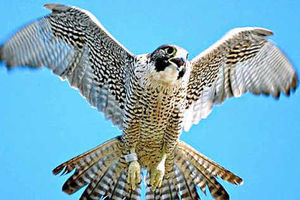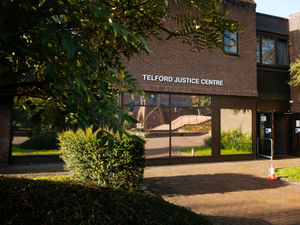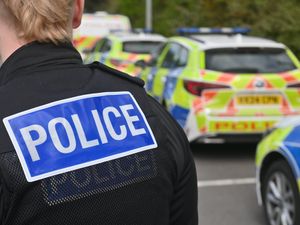A disgrace! Bird group hits out as poison used to kill rare falcon in Shropshire
A peregrine falcon found dead in a quarry on Clee Hill was poisoned, it has been confirmed.

The male bird found in June was poisoned by diazinon, according to toxicology tests.
Two chicks were found dead in the nest and a female falcon went missing from the area after the body of the bird was found.
The news has been branded an "absolute disgrace" by a member of Shropshire Peregrine Group. It comes after three peregrines, which are a protected species, were also found poisoned in the same area in 2010 and 2011.
John Turner, the group's co-ordinator, said: "This is yet another tragic incident at this site.
"The female parent also disappeared and we are concerned she may have also been poisoned.
"The situation was made even worse as the two chicks in the nest also died with the loss of the parents."
The group and the RSPB have offered a £1,000 reward for information leading to the conviction of anyone found to have been involved in the poisoning.
Mr Turner said the group had been monitoring the site since the birds began nesting in April and the two chicks would have been ready to fly soon.
But on June 15 a volunteer reported a dead adult male peregrine at the base of the breeding cliff.
The body was recovered by the RSPB and passed to Natural England for toxicology which found the bird was poisoned by diazinon, a form of insecticide – the same product as in previous incidents.
The birds are fully protected under the Wildlife and Countryside Act and anyone convicted of killing these birds could receive up to six months in prison along with a fine.
Mr Turner said: "It is shocking.
"They are rare birds and they have only just recovered from almost being wiped out.
"We organised volunteer patrols of the area after 2010 and the last couple of years had been OK.
"We thought we had stopped it but this year we have been proved wrong. We have got to increase patrols next year with the help of the police.
"There are only two pairs in the whole of the south Shropshire area – and one has been removed now.
"They are not common birds, we are very lucky to see them. They really are beautiful birds.
"We hope the police get some information through about this from people in the Clee area. It is an absolute disgrace."
Constable Julian Ward, wildlife crime officer for West Mercia Police, said: "There have been previous incidents in this area and the illegal use of poison poses a risk to wildlife and to people.
"We believe somebody in the local community will have information about who is involved and we would urge them to contact police."
Information can be reported to West Mercia Police on 101 quoting reference 649S of June 15 or Crimestoppers UK on 0800 555111 or at crimestoppers-uk.org




